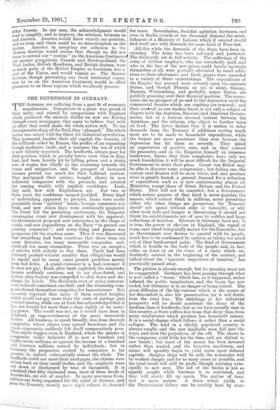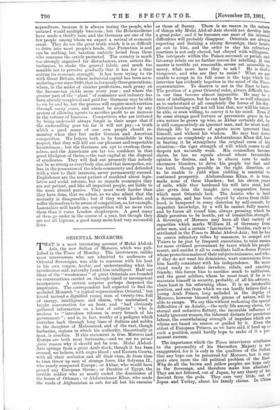THE DEPRESSION IN GERMANY.
THE Germans are suffering from a past fit of economic megalomania. Conquerors in a great war, proud of their unity, and stirred by comparisons with England which produced the envious dislike we now see flowing through every newspaper, they came to believe that with an effort they could make the whole nation rich. To use the expressive slang of the Turf, they "plunged." The whole nation was seized with the thirst for industrial speculation. They possessed, besides their old capital, the remains of the milliards ceded by France, the profits of an expanding though moderate trade, and a resource the use of which is now bitterly regretted. The landlords, always poor for their position, which is socially better even than in Eng- land, had been heavily hit by falling prices and a rising rate of wages, due chiefly to the swarming towards the towns and emigration, and the prospect of increased incomes proved too much for their habitual caution. They mortgaged their estates, bought shares in new industrial companies with the proceeds, and awaited the coining wealth with implicit confidence. Look, they said, how rich Englishmen are. For two or three years the confidence seemed justified. Every kind of undertaking appeared to prosper, loans were easily procurable from " spirited " banks, foreign commerce was brisk, and new steam lines were continually projected. The Court fed the prevailing excitement, the Emperor encouraging every new development with his approval ; the Government proposed new enterprises in the shape of canals, and new expenditure on the Navy "to protect our growing commerce" ; and every thing and person was prosperous till the reaction came. Then it was discovered that everything had been overdone, that there were too many factories, too many mercantile companies, and, above all, too many steamships. There was an overplus of articles with nobody to buy them. Trade had been furiously pushed without security that obligations would he repaid, and in many cases proved profitless merely from bad debts. A grand customer is a bad customer if he does not pay. Bank after bank exploded, the remainder became suddenly cautious, not to say close-fisted, and factory after factory was compelled to shut down and dis- charge its hands. The dividends even of going concerns were reduced sometimes one-half, and the steamship com- panies found themselves competing for bare existence It is currently reported that many of them carried freights which would not pay more than the costs of carriage just to avoid rusting, while one at least has acknowledged that it has not freight for more than a clear eighth of its carry- ing power. The result was not, as it would have been in England, an impoverishment of the great mercantile houses. All business, to speak broadly, was done through Companies, whose shares were spread broadcast, and the whole community suddenly felt itself comparatively poor. That might happen even in England, where the income of companies under Schedule D is now a hundred and eighty-seven millions, as against the income of a hundred and fourteen millions earned by individuals; but in Germany the proportion earned by companies is far greater, is, indeed, substantially almost the whole. The landlords could not meet•their mortgages, the citizens were driven back on their small trades, and the employs were cut ..down or discharged hy tens of thousands.. It is ad. nutted that fifty thousand men, most of them heads of households, are out of employ. In many provinces Com- mittees are being organised for the relief of distress, and even the Treasury, usually most rigid, relaxes its demand for taxes. Nevertheless, Socialist agitation increases, and even in Berlin crowds of ten thousand demand the estab- lishment of a Ministry of Labour, which if created would find, itself met with demands for some kind of Poor-law. , All this while the demands of the State have been in- creasing. The Army has been enlarged and perfected. The dock-yards are in full activity. The sufferings of the army of civilian employes, who are wretchedly paid, and who in the face of the new prices could hardly maintain themselves at all, were partially alleviated by small addi- tions to their allowances, and. fresh grants were conceded to a variety of State undertakings. The expenditure of the Empire has pressed. more severely upon the separate States, and though Prussia as yet is silent, Saxony, Bavaria, Wiirtemberg, and. probably minor States, are publicly groaning over their financial position. The econo- mists see no prospect of an end to the depression until the commercial treaties which are expiring are renewed ; and their rens Aral, as our readers know, is not only a subject of dispute with the Austrian, Russian. and American Govern- ments, but of a furious internal contest between the Agrarians and. the citizens, who object to further taxes on food. The latter declare that it is useless to relax demands from the Treasury if additions costing much more are to be made to household expenditure, while the former are more persistent than ever because the depression has hit them so severely. They plead an expectation of positive ruin, and as they control the peasantry, and. as the Emperor, himself an immense landowner, knows that their complaints have only too much foundation, it will be most difficult for the Imperial Government to resist their pleas. Count von Billow may be able to discover some compromise ; but failing one, the contest next Session will be most bitter, and may produce what is greatly feared, a general demand for a reduction of expenditure such as is now embarrassing almost all Ministries except those of Great Britain and the United States. That will not be conceded ; but a Government which resists prayers of that kind. is never popular, the masses, which cannot think in millions, never perceiving either why when things are .prosperous the Treasury shoule not spend without stint or foresight, or why when work fails and. hunger is threatening it should not throw its establishments out of gear by sudden and large reductions of taxation. Electors in Germany have not, it is true, the power of electors in England, the repeal of taxes once voted being really matter for the Executive ; but no Government ever desires to quarrel with its people, much less to be condemned by opinion as taking too much out of their hard-earned gains. The kind of Government which is hostile to the body of the people, and, in fact, relies on force or on the votes of a caste, which un- doubtedly existed in the beginning of the century, and talked about the "ignorant impatience of taxation," has practically passed away.
The picture is gloomy enough, but its meaning must not be exaggerated. Germany has been passing through what is new called. a "boom," which has, as it happened, rather inflated the public imagination, and the boom has now ended, but Germany is in no danger of being ruined. The great diffusion of the big venture which is the source of her discomfort is also her preservation, for it will distri- bute the total loss. The shrinkage of her industrial prosperity will no doubt accelerate the decay of the medium class of landlords ; but as we have recently seen in this country, a State suffers less from that decay than from many misfortunes which produce less household misery. It is a social change which follows it rather than a social collapse. The land in a thickly populated country is always sought, and the new landlords soon fall into the ways, and even the prejudices, of the old. The shares in the companies yield little for the time, and. are shifted to new hands ; but most of the money has been invested rather than wasted, and the factories, machinery, and mines will speedily begin to yield again upon reduced capitals. Surplus ships will be sold, the remainder will be worked cheaply and for as many years as possible, and the total result will still be profit, though accruing prin- cipally to new men. The aid of the banks is not so eagerly sought while business is so restricted, and. they will slowly fill up again. The matter of taxa- tion is more serious. A State which yields to the Protectionist fallacy can be terribly hurt by over- expenditure, because it is always taxing the people, who untaxed would multiply business ; but the Hohenzollerns have made a thrifty race, and the Germans are one of the few people among whom we expect a revival of economic sense. They do see the great truth which it is so difficult to drive into most people's heads, that Protection is and can be nothing but taxation unfairly levied from those who consume the article protected. The country is much too strongly organised for disturbances, even serious dis- turbances, to shake the general fabric, and much too sensible not to perceive gradually that it has for a time outrun its economic strength. It has been trying to vie with Great Britain, where industrial capital has been =cu- mulating ever since 1820, that is, for nearly three generations; where, in the midst of sinister predictions, each penny on the Income-tax yields more every year ; and where the greater part of the "plant" of commerce and industry has been already completed and paid for. Germany may be able to vie by and by, but the process will require much exertion through many years, and cannot be accelerated by any system of allowing agents to sacrifice profit to an increase in the volume of business. Competitors who are irritated by being undersold always forget in their anger that if the underselling goes too far it will not pay,—a truth which a good many of our own people should re- member when they fret under German and American competition. We believe both to be formidable in this respect, that they will kill out our pleasant and respectable leisureliness ; but the Germans are apt to overleap them- selves, and the Americans are far too confident in that great bludgeon of theirs,—the vast capital at the disposal of syndicates. They will find out presently that nobody can be as strong as everybody else, and that monopolies, un- less in the possession of the whole community and defended with a view to their interests, never permanently succeed. Englishmen are the most patient of mankind about legis- lative and social reforms, but as regards economics they are not patient, and like all impatient people, are liable to the most absurd panics. They must work harder than they have done, that we admit, as we also admit that the necessity is disagreeable; but if they work harder, and suffer themselves to be aware of competition, as, for example, Lancashire mill hands are, competition will no more ruin them than it ruins London shopkeepers. A good. many of them go under in the course of a year, but though they are not all Liptons, a good many more lead very successful lives.











































 Previous page
Previous page